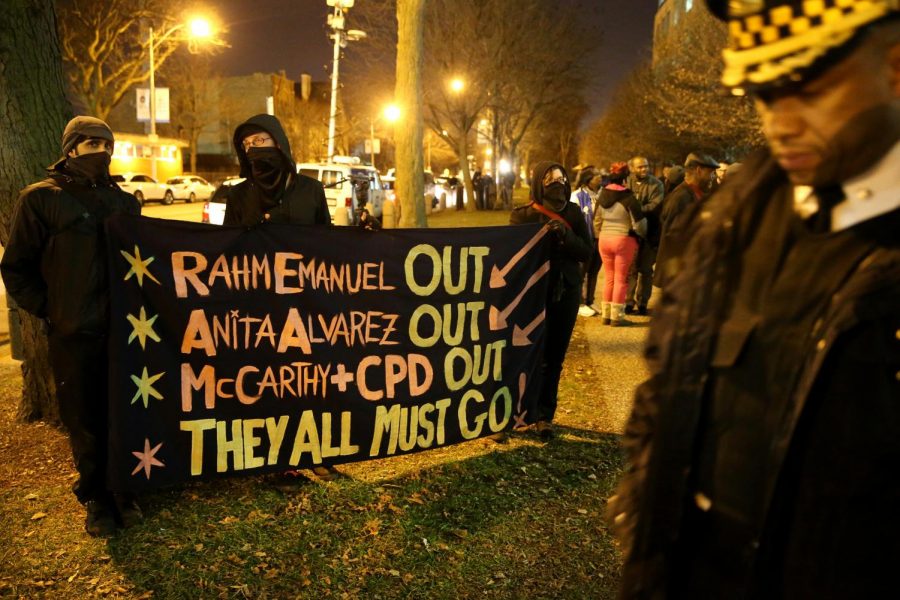Reform only works if officers speak up
Protesters stand outside of the CPD headquarters after a monthly board meeting on Dec. 9, 2015.
Sep 6, 2018
As the long-awaited Laquan McDonald murder trial began on Sept. 5, Chicago seems to be reckoning with itself. In a wavering step toward reform, Attorney General Lisa Madigan and Chicago Police Superintendent Eddie Johnson released a draft consent decree on Chicago police reform.
It is a detailed, 232-page document that addresses a myriad of issues facing the Chicago Police Department. Most importantly, the changes within the department will be overseen by an independent monitor and enforced by a federal judge.
Madigan believes “it will be different this time,” indicating that change is on its way. This latest attempt at reform could be the wake-up call the CPD needs, but reform requires action beyond altered policy. Individual officers within the CPD have to change.
The McDonald shooting has had a strong force on affecting change in Chicago. Jason Van Dyke, the officer who shot and killed McDonald on Oct. 20, 2014, is the first CPD officer charged with murder for an on-duty fatality in more than 30 years.
That fact is indicative of a larger problem. Chicago police officers have killed 96 people — disproportionately young men of color — since 2010, and certainly many more have been killed in the last 30 years. It’s telling, too, that the officers who fired their guns on duty during that period had, on average, almost a decade of experience each.
Get The Daily Illini in your inbox!
These numbers show how the CPD protects bad officers from discipline. In fact, the department and the city have spent nearly $700 million on police settlements since 2004 — quite a sum for a city grasping at pension money to keep itself fiscally afloat.
Indeed, McDonald’s death was nearly erased, like innumerable others, wiped away by the insular CPD cover-up machine.
As explained in the Chicago Tribune and WBEZ’s podcast “16 Shots,” that machine began to work as soon as McDonald was down. In police dispatch audio from the night, the emergency dispatcher said, “I need to get some info on the victim condition, whatever you can, when you can, OK?”
An officer corrects her immediately, saying, “offender.”
“Right,” she responds. “That’s what I meant.”
As explained in “16 Shots,” the language used by the CPD has been informally codified by tradition in situations like these. Offender, not victim. The officer didn’t shoot; he was involved in a shooting. McDonald didn’t die, he succumbed to his wounds. This standardized language is a sign of the deeply entrenched “code of silence” enforced by the CPD.
The consent decree, however, could be a turning point in police practice. The Fraternal Order of Police Lodge No. 7, the CPD union, condemned the document, claiming internal changes could be made instead.
This is doubtful, considering the internal affairs of the CPD have a storied history of abuse, brutality and corruption. But the statement could be a sign the consent decree is creating unease among officers, possibly showing that change is coming.
Meanwhile, however, Lori Lightfoot, former president of the Chicago Police Board, criticized the document, saying it too often “copies and pastes current police department policies.”
Even if it is true the consent decree is simply current policies enforced by a federal judge, it is still a step in the right direction. More oversight is always welcome. But in order to really make the consent decree a success, good cops need to step up and speak out. The “blue code of silence” needs to end in order for policy reform to work, and that will only happen if reporting misconduct becomes the norm.
Kyra is a sophomore in LAS.






